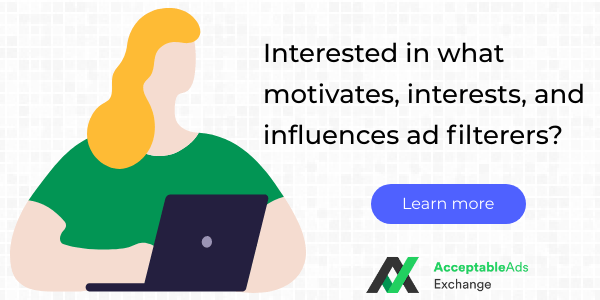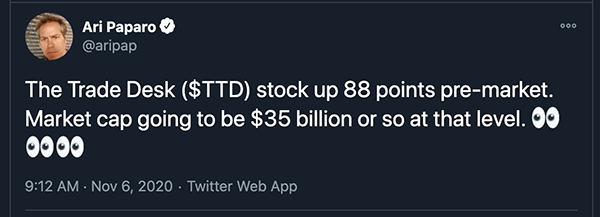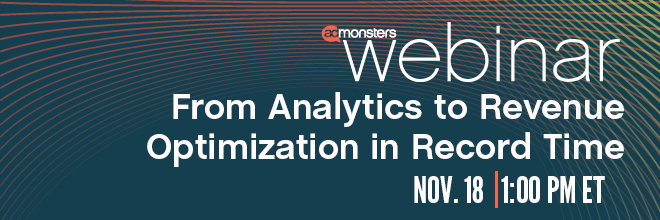 |
|||||||||||||
|
|||||||||||||
| Investors Mad About that Programmatic CTV |
| The stock market went a little crazy on news of The Trade Desk’s Q3 revenue: $216 million and a 45% jump from the previous quarter. OK, Q2 was miserable for just about everybody in ad tech, so a 45% ascent from close-to-oblivion isn’t... Wait, that $216 million was a 32% year over year increase? TELL THE BROKER TO BUY, JEEVES—BUY, BUY, BUY!
|
| The Programmatic CTV revolution isn’t coming—it’s definitely here, and the advertisers are going to embrace it en masse. These numbers are going to be in the stratosphere by next year. |
| Ad Filterers Are Enthusiastic Purchasers of Digital Content | ||
Whether it comes to news services, online magazines, study programs, or learning materials… ad filterers want to purchase it. “Ad filterers” or “selective ad-blocking users,” encompass more than 200 million individuals defined by the GlobalWebIndex (GWI) as “users who have blocked ads in the past month but discover brands or products through ads seen online and have clicked on an online ad in the past month.” They flock to digital content, outspending their non-ad-blocking user counterparts at a rate of three to one. And, while this might not be surprising given ad filterers’ sky-high levels of engagement and the amount of time this dynamic demographic spends online, it’s worth spending a bit of time considering the implications of this staggering statistic. The desire for premium content, especially the kind that comes at an extra cost, fits in with some things we know about the ad filtering demographic. This is a group composed of wealthier-than-average, highly educated, engaged individuals. We know that ad filterers use their wealth to purchase products after seeing ads at a greater rate than non- ad-blocking users, so it’s not surprising that some of that disposable income would also go towards digital paid content. It also stands to reason that ad filterers would purchase digital content: news subscriptions, study materials, and magazine subscriptions are generally purchased at a higher rate by people with higher levels of education. And “engagement” isn’t a personality quirk that’s relegated to brand loyalty or social media engagement—studies show that people who are engaged in one aspect of their lives tend to show similar levels of engagement in other areas. That means that ad filterers’ choice to dive deep into digital media could very well be a result of the same kind of curiosity and engagement that propels them towards following their favorite brands’ social media. And, of course, it’s a matter of priority. We touched on the topic of prioritization in our last study, which answered the question “What do ad blocking users prioritize?” |
||
| Ad blocking users, as it turns out, prioritize being well-informed. 79.2% agreed with the statement “It is important to be well-informed about things.” […] A well-informed person, then, is someone who is not only omnivorous when it comes to knowledge… but also always hungry for the next brain snack. Ad filterers, a subset of ad blocking users, appear to have similar priorities. They certainly exhibit the same appetite for knowledge of all kinds, and the desire to access information that will enhance their baseline of knowledge is strong enough that they’re willing and ready to purchase access to premium, paid, digital content. |
||
|
||
 |
| Bloomberg Gets on CTV FAST |
| It’s not just the investors that see the mile-high potential for the ad-supported CTV space. Bloomberg has just jumped on the FAST train (Free Ad-Supported Streaming TV Services), a term generally attributed to Alan Wolk from TVREV) with Quicktake, a network that promises 10.5 hours of daily programming off the bat, with 10 original series and four daily news shows that cover a broad range of content. It’s Bloomberg, so it will be business-focused, but will also make time for culture, politics, society, sports, and travel. We know what you’re thinking—where can we watch?!? Well, it’s more like where can’t you—according to VideoNuze, Quicktake will be available on Roku, Fire TV, Apple TV, Android TV, and Samsung TV platforms, as well as within streaming services Samsung TV Plus, Tubi, and Xumo. American Express and AT&T Business are sponsoring the launch. |
| We’re betting we see a flood of FAST offerings introduced over the next 12 months, particularly since NBCU’s Peacock wowed pandemic-captive audiences. Rumor has it, even Hulu is working on a FAST version. You thought we were approaching CTV subscription fatigue? You ain’t seen nothing when just about every premium publisher on the Internet has a FAST channel. |
| @{optoutfooterhtml}@ |













